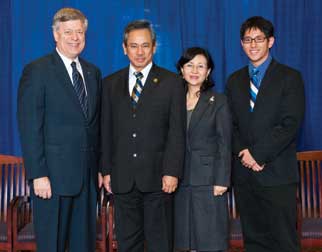Pitt Legacy Laureate Wen-Ta Chiu is Named Taiwan’s Health Minister
 From left, Chancellor Mark A. Nordenberg; Wen-Ta Chiu; his wife, Juan; and their son, Jason, in a photo taken during the 2009 Legacy Laureate dinner at Pitt.
From left, Chancellor Mark A. Nordenberg; Wen-Ta Chiu; his wife, Juan; and their son, Jason, in a photo taken during the 2009 Legacy Laureate dinner at Pitt.Taiwan’s premier, Wu Den-yih, appointed Pitt alumnus Wen-Ta Chiu the new minister of Taiwan’s Department of Health, effective Feb. 1, according to the Taipei Times. Chiu, a 2009 Pitt Legacy Laureate, was one of four new ministerial appointments to the premier’s cabinet.
Chiu is a highly distinguished neurosurgeon, medical researcher, academic leader, and public health advocate. He served as the president of Taipei Medical University from 2008 to 2011, stepping down earlier this month after being named to the premier’s cabinet. Chiu received his master’s and doctoral degrees in public health from Pitt’s Graduate School of Public Health (GSPH) in 1987 and 1989, respectively.
In 1999, Chiu was recognized by Pitt’s GSPH as one of the 50 most influential faculty members or students in the school’s history. The Chiu family represents three generations of GSPH graduates: Yung-Tsong Chiu, Wen-Ta’s father, received his Master of Public Health degree from the school’s Department of Health Policy and Management in 1954; and Wen-Ta’s son, Jason, graduated from the school’s epidemiology program in December 2010.
As president of Taipei Medical University, Chiu led the successful growth of a world-class medical university and hospital system, including doubling the size of the hospital system to 3,000 beds. During the same time, he also served as superintendent of Shuang Ho Hospital and as a professor in the Taipei Medical University’s College of Medicine and College of Public Health and Nutrition. In addition, he served as superintendent of Wan Fang Hospital, chief of neurosurgery, director of the Biomedical Informatics Center, and dean of the School of Public Health.
Widely regarded for his accomplishments as a head-injury researcher, Chiu developed the world’s largest head-injury registry and promoted the adoption of helmet laws, which dramatically reduced the rate of motorcycle-related deaths in Taiwan.
Chiu has devoted himself to public service and public health practices in Taiwan as a primary investigator for the Center for Health Policy Research and Development of the National Health Research Institutes and as a consultant for the Department of Health. He has made significant leadership contributions in public health as president of the Asia-Pacific Academic Consortium for Public Health, the Academy for Multidisciplinary Neurotraumatology, and the Taiwan Neurotrauma Society; and as president of the Asia Oceania Neurotrauma Society.
Chiu’s leadership in public health has garnered many awards, including a Contribution Award from the Asia-Pacific Academic Consortium for Public Health in 2007.
Chiu earned, in addition to his Pitt degrees, the Doctor of Medical Science degree in neuroscience from Nihon University School of Medicine, Tokyo, and the MD degree from Chung-Shan Medical College in Taiwan. He was a research fellow in neurosurgery at Stanford University.
Other Stories From This Issue
On the Freedom Road

Follow a group of Pitt students on the Returning to the Roots of Civil Rights bus tour, a nine-day, 2,300-mile journey crisscrossing five states.
Day 1: The Awakening
Day 2: Deep Impressions
Day 3: Music, Montgomery, and More
Day 4: Looking Back, Looking Forward
Day 5: Learning to Remember
Day 6: The Mountaintop
Day 7: Slavery and Beyond
Day 8: Lessons to Bring Home
Day 9: Final Lessons

